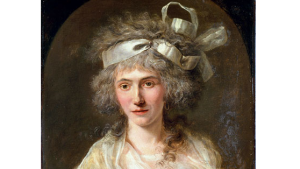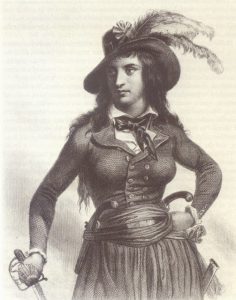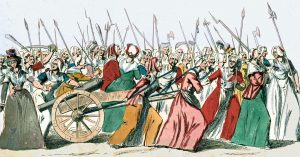Théroigne de Méricourt (1762-1817)
“At last the time is ripe for Women to emerge from their shameful nullity, where the ignorance, pride and injustice of men had kept them enslaved for so long a time; let us return to those times when our Mothers, the Gauls and the proud Germans debated in public assemblies, fought side by side with their husbands and repulsed the enemies of Liberty”
Born Anne-Josèphe Terwagne in Belgium, Théroigne de Méricourt, a singer and orator, became infamous her revolutionary militancy and her struggle for woman’s rights during the French Revolution (1789-1998).
Théroigne de Méricourt (1762-1817) was the daughter of well-off peasant proprietor, but suffered a tragic childhood, and had to care for herself from a young age. Her mother died in childbirth with one of her younger siblings, and de Méricourt was sent to live with her aunt, which treated her as a servant. She was shuffled between her aunt’s household, a convent (until her aunt could no longer afford it), and her father’s relatives, who also treated her unfairly and overworked her. Finding living with her family unsustainable, de Méricourt left and began providing for herself through a variety of jobs, including cow herding and working as a governess. Finally, she found a stable position as governess in the household of Madame Colbert. In this position she was able to save money and study opera singing in different European cities because of this. Though she cultivated her singing talent as a governess and gave several private concerts throughout her adult life, a singing career never came to fruition.
Théroigne de Méricourt dealt with more than her fair share of abusive male relationships. An English officer courted her and took her to England, promising to marry her, but left her in Paris in 1787. She was left pregnant with her daughter, Françoise-Louise Septenville, with the officer denying paternity. She nonetheless was granted some of his inheritance, which she invested wisely. Giacomo Davide, an Italian singer, was going to take her to Italy to train in singing, but he also backed out of the plan, abandoning her. When she finally made it to Italy with another suitor, Giusto Ferdinando Tenducci, she realized he was trying to take financial advantage of her. To complete her troubles, Théroigne de Méricourt also dealt with the tragedy of the death of her daughter Françoise-Louise in the spring of 1788.
Upon returning to Paris in May 1789, she renamed herself from Anne-Josèphe. It is unknown why exactly she did this, but it may be because she had been mentioned by a witness in an investigation of the October Days. She did not invent de Méricourt; it was an addition given to her name by the royalist press, based off her hometown of Marcourt. When she returned to Paris, she joined the supporters of the French Revolution. By spending time at public meeting places, she immersed herself in the events of the revolution, conducting her own salon and attending meetings of the National Assembly, like several other women. She founded and operated Société des amis de la loi (Society of Friends of the Law) for a short time, which aimed to promote patriotic work. Following the end of this group, she participated in and supported clubs for women and both sexes.
It was rumored throughout the press that Théroigne de Méricourt participated in the insurrection of Bastille Day on 14 July 1789, which led to the liberation of its prisoners, as well as leading the Women’s March on Versailles on 5 and 6 October 1789. Historian, Simon Schama described someone who was assumed to be her at the Women’s March on Versailles as an “extraordinary figure astride a jet-black horse … sporting a plumed hat and a blood-red riding coat, carrying pistols and a saber” (Beckstrand 2013, 18). However, many of the stories about de Méricourt life were exaggerated. She became a mythical figure, not at least because she challenged the gender order already with her outfit: She usually dressed in a male riding outfit.
She was a supporter of the moderate Girondist, and was later persecuted for thi position by the more radical Jacobins, the most extreme political group in the French Revolution. Théroigne de Méricourt spoke up for radical views in salons and in the National Assembly. One of the issues she fought for was the right of women to be armed and participate in the Revolutionary Wars (1792-1802) to defend their nation. She believed that if women were to be considered equal citizens, they need to have equal rights including the right to be armed, because without this right only men as “defender of the nation” were able to become citizens. This demand created fierce opposition by male Girondists and Jacobins.
De Méricourt was abducted and imprisoned in February 1791 in an Austrian prison, where she was kept until November of that year. She triumphantly returned to Paris, lauded as “The Amazon of Freedom.” Her brother placed her in an asylum in 1795, for she was certified insane earlier that year. This possibly resulted from her time spent in jail as well as abuses at the hands of people who did not approve of her activism, but might well be also simply reflect the perception of her believes and her unusual behavior by society. She spent her last days being transferred among several asylums until she died in 1817.
Théroigne de Méricourt’s life and activism are certainly still relevant today, in that they show us how women during the French Revolution were much more aware of their lesser social status than one might assume. She did not simply accept the status of women that Republican society proclaimed.
Jessamine Gaul, Media and Journalism/Political Science, Class of 2018
Sources
Literature and Websites
- “Théroigne de Méricourt, Anne-Josèphe (1762-1817). Women in World History: A Biographical Encyclopedia at: https://www.encyclopedia.com/women/encyclopedias-almanacs-transcripts-and-maps/theroigne-de-mericourt-anne-josephe-1762-1817 (Accessed 18 April 2018).
- “Théroigne de Méricourt.” Wikipedia, at: https://en.wikipedia.org/wiki/Simone_de_Beauvoir (Accessed 18 April 2018).
- “Women in the French Revolution.” Wikipedia, at: https://en.wikipedia.org/wiki/Women_in_the_French_Revolution (Accessed 18 April 2018).
- Beckstrand, Lisa. Defiant Women of the French Revolution and the Rise of Feminism, 15-20. Madison [N.J.]: Fairleigh Dickinson University Press, 2009.
- Darline Gay Levy and Harriet B. Applewhite, “A Political Revolution for Women? The Case of Paris,” in Becoming Visible: Women in European History, ed., Renate Bridenthal, Susan Mosher Stuard, Merry E. Wiesner, 265-292.Third edn. Boston: Houghton Mifflin, 1998.
- Godineau, Dominique. “Théroigne de Méricourt,” Université de Rennes 2, France Archives, Recueil des Commémorations nationales 2017, at: https://francearchives.fr/de/commemo/recueil-2017/26287415
Images



